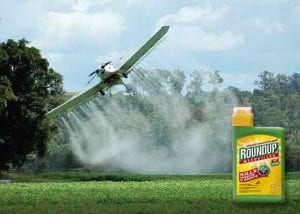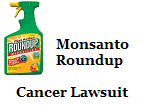Roundup, non-Hodgkin’s Lymphoma Linked – Studies
Non-Hodgkin lymphoma cases have increased significantly in the last 30 years, according to a scientific review published in 2014. The study suggests chemical pesticides and herbicides – especially glyphosate from Roundup – are a major contributing factor to that increase.
The 2014 Roundup cancer study is titled, “Non-Hodgkin Lymphoma and Occupational Exposure to Agricultural Pesticide Chemical Groups and Active Ingredients: A Systematic Review and Meta-Analysis.” It was published in the International Journal of Environmental Research and Public Health. The paper focused on reviews and meta-analyses of nearly 30 years worth of epidemiological research on pesticides. It examined the link between non-Hodgkin lymphoma and occupational exposure to 80 active pesticide ingredients and 21 chemical groups. The study notes pesticides are often grouped according to the type of pests that they control. It noted the difference between fungicides, insecticides, and herbicides – respectively used to kill fungi; insects; weeds and plants.
Glyphosate Doubles Lymphoma Risk
Authors of the 2014 glyphosate cancer study tried to reconcile a trend among farm workers with low mortality but high cancer rates. Researchers believe Roundup exposure best explains this (apparent) contradiction. The Roundup cancer study found glyphosate exposure doubled one’s risk of developing non-Hodgkin lymphoma.
Glyphosate, B-Cell Lymphoma Link
Besides showing occupational pesticide exposure in agriculture as a risk factor for non-Hodgkin lymphoma, the study also found glyphosate exposure linked to a common non-Hodgkin lymphoma subtype, B-cell lymphoma.
More Studies Show Roundup Non-Hodgkins Lymphoma Link
Several older Roundup cancer studies also researched occupational glyphosate exposure in Sweden, the U.S. and Canada. They also found increased incidence of non-Hodgkin lymphoma, even after adjustments which considered other pesticides.
- In 2008, the International Journal of Cancer published a Swedish study which found glyphosate exposure doubled one’s risk of developing non-Hodgkin lymphoma within 10 years.
- In 2003, Occupational and Environmental Medicine published a U.S. study that examined thousands of Midwestern farm workers. The workers had increased incidences of non-Hodgkin lymphoma which the study authors linked with glyphosate exposure.
- In 2001, Cancer Epidemiology Biomarkers & Prevention published Canadian research that found a dose response relationship between glyphosate exposure and non-Hodgkin lymphoma.
Farming Communities Non-Hodgkin Lymphoma Leukemia and Lymphoma Society reported a higher incidence of non-Hodgkin lymphoma in farming communities. Several studies (including those above) have suggested certain herbicide and pesticide ingredients are linked to lymphoma. The true number of lymphoma cases caused by these herbicide and pesticide exposures is not yet known. Consequently, there is an urgent need for more glyphosate exposure research.
Leukemia and Lymphoma Society reported a higher incidence of non-Hodgkin lymphoma in farming communities. Several studies (including those above) have suggested certain herbicide and pesticide ingredients are linked to lymphoma. The true number of lymphoma cases caused by these herbicide and pesticide exposures is not yet known. Consequently, there is an urgent need for more glyphosate exposure research.
Non-Hodgkin Lymphoma Victims File Roundup Cancer Lawsuits
Several farmers and others working in agriculture have filed lawsuits against Monsanto, the maker of Roundup. The plaintiffs allege their non-Hodgkin lymphoma was caused by Roundup (glyphosate) exposure.
Roundup Cancer Lawsuits Filed
March 2016 – The family of California farmer Jack McCall filed a wrongful death lawsuit against Monsanto. Their petition alleges Roundup exposure caused Mr. McCall’s cancer. He was diagnosed with a rare form of non-Hodgkin lymphoma after using Roundup for nearly 30 years. According to the lawsuit petition, Mr. McCall used Roundup liberally on his 20-acre fruit and vegetable farm in Cambria. He died in December of 2015 after suffering a massive stroke due to complications from cancer.February 2016 – James and Brenda Huerta filed a Roundup cancer lawsuit in California against Monsanto. The couple claim glyphosate exposure caused Brenda to develop non-Hodgkin lymphoma. The Roundup cancer lawsuit claims both were exposed to Roundup while living on a sod farm sprayed with glyphosate from 2004 to 2008.
November 2015 – Christine Sheppard worked on a coffee farm she owned in Hawaii from 1995 to 2004. For roughly eight years, Ms. Sheppard sprayed Monsanto’s Roundup (glyphosate)] to kill weeds. She alleges her Roundup exposure caused her non-Hodgkin lymphoma. Her Roundup lawsuit petition claims Monsanto failed to warn the public and her about the dangers of glyphosate.
October 2015 – Joselin Barrera and Elias de la Garza of Texas filed Roundup cancer lawsuits. Their petition claims their non-Hodgkin lymphoma diagnoses are related to glyphosate exposure. Joselin Barrera is the child of farm workers. Elias de la Garza is a former farm worker and landscaper.
Monsanto’s Own Documents show Roundup not proven safe
Monsanto continues to claim publicly that Roundup (glyphosate) is not a carcinogen, despite the pronouncement of the World Health Organization in 2015 that glyphosate is a “probable carcinogen.” Behind company doors, however, recently released Monsanto emails and documents show the company never performed adequate studies to settle the safety question. Lead Monsanto toxicologist Donna Farmer told Monsanto management wrote in an internal email: “You cannot say that Roundup is not a carcinogen. (We) have not done the necessary testing on the formulation to make that statement.”
The studies above did the “necessary testing,” as did the WHO. They have found that Roundup looks more and more like a carcinogen. Meanwhile, Monsanto looks more and more guilty of, at the very least, failing to properly test its herbicide/pesticide, as new evidence comes to light in the Discovery phase of Roundup Cancer Litigation.
 RELATED
RELATED
- Roundup Non-Hodgkins Lawsuit
- Monsanto Lawsuit
- Roundup Lymphoma Lawsuit
- EPA Monsanto Collusion?
- EPA Monsanto Ties Cancerous
- Monsanto sued again for False Roundup Labeling

by Matthews & Associates




